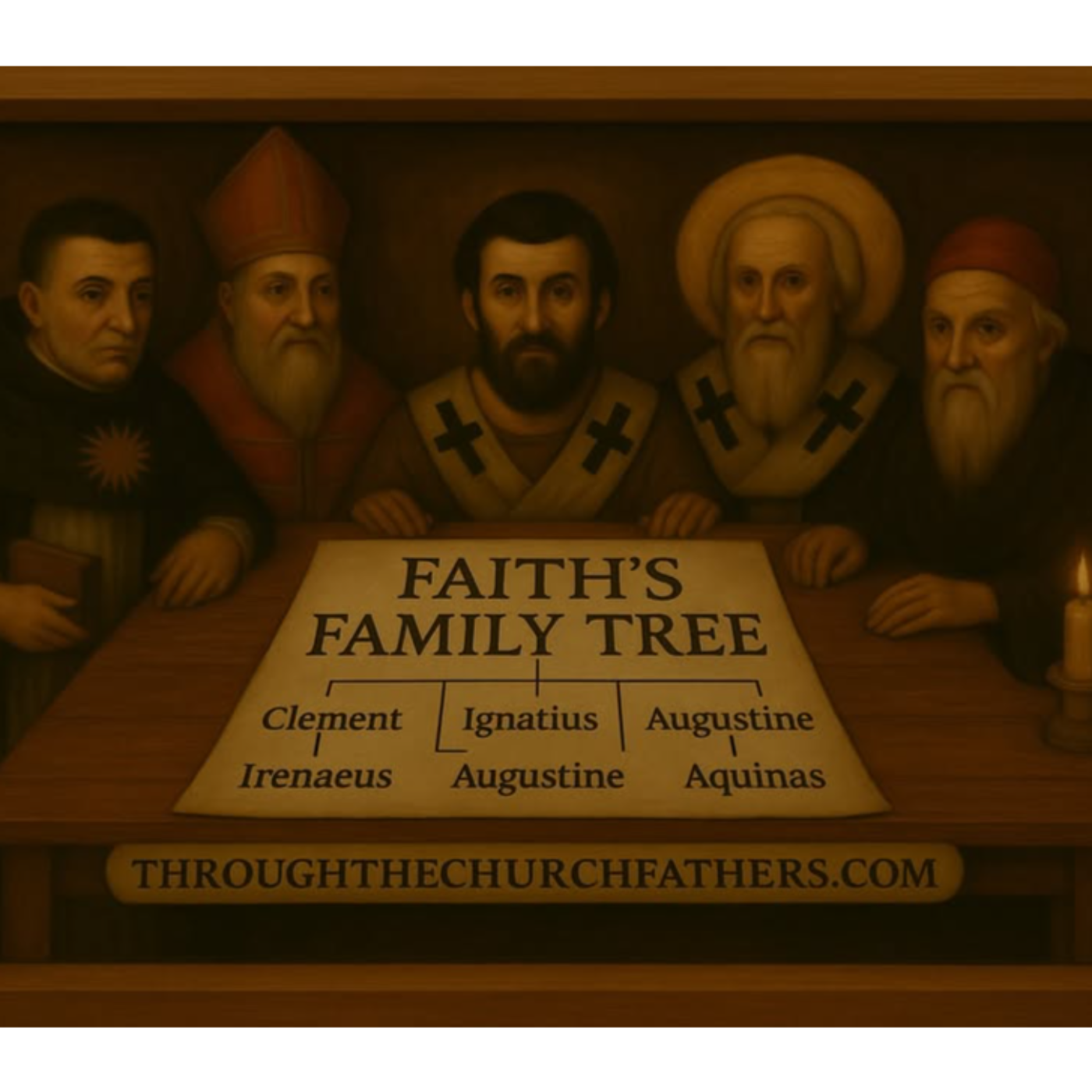Through the Church Fathers
Join Through the Church Fathers, a year-long journey into the writings of the early Church Fathers, thoughtfully curated by C. Michael Patton. Each episode features daily readings from key figures like Clement, Augustine, and Aquinas, accompanied by insightful commentary to help you engage with the foundational truths of the Christian faith.Join Our Community: Read along and engage with others on this journey through the Church Fathers. Visit our website.Support the Podcast: Help sustain this work and gain access to exclusive content by supporting C. Michael Patton on Patreon at patreon.com/cmichaelpatton.Dive Deeper into Theology: Explore high-quality...
Through the Church Fathers: November 28

Clement’s final lesson feels almost monastic: simplicity of step as simplicity of soul. He rebukes luxury even in sandals, urging us to walk lightly upon the earth—bare feet nearer to humility than ornamented leather. Augustine follows with a letter forged in the fires of persecution, pleading with Bishop Januarius for peace amid Donatist violence. He exposes hypocrisy and appeals for a public conference, a dialogue of truth over blood. Then Aquinas, calm and exacting as ever, explains how the soul is shaped by repetition—how habits are not born of flashes of passion but through the slow rhythm...
Through the Church Fathers: November 27

Clement of Alexandria, Augustine’s Letter 84, Aquinas Q50 A5 — Whether Any Habit Is in the Will)
The human soul bends toward what it loves most—Clement warns me not to hide behind displays of wisdom, for the true adornment of the Christian is humility and restraint, even down to the sandals on our feet. Augustine then writes with the gentleness of a bishop and the precision of a theologian, guiding a troubled friend through the tension between action and contemplation—between the outer work of charity and the inward rest of grace. Aquinas closes the day by explaini...
Through the Church Fathers: November 26

Clement of Alexandria begins with the sanctity of marriage, teaching that the marital act is not for indulgence but for partnership with God in creating and shaping life. To misuse that union, he warns, is to rebel against the order of nature itself. True chastity is not abstinence but purpose—a life in which desire serves reason and reason serves God (Genesis 1:28; 1 Corinthians 6:15–20).
Augustine, writing to Novatus, speaks of a different discipline: the surrender of what we love for the sake of the gospel. His letter reveals the ache of ministry, where obedience sometimes means letting go of c...
Through the Church Fathers: November 25

Temperance, vigilance, and order—the same virtues that shape our waking lives, Clement of Alexandria says, should guide our sleep. When the day ends, the disciple’s rest must not become indulgence. A simple bed, a light meal, and a watchful heart prepare the soul for prayer even in silence. For the Christian, sleep is not escape but renewal—an act of readiness for the next call of God (Luke 12:35–36; 1 Thessalonians 5:7–8).
Augustine carries that same spirit of discipline into the intellect. In his final letter to Jerome, he insists that truth can never be served by deceit, even when...
Through the Church Fathers: November 24

Even righteous zeal can burn too hot. Today’s readings confront the peril of a passion that begins as just and ends as blind. In Question 48, Article 3, I weigh whether anger helps or hinders reason—and discover that what begins as a servant soon becomes a tyrant if left unchecked.
Thomas Aquinas, Summa Theologica, Part 1–2, Question 48, Article 3 (Whether Anger Hinders the Use of Reason)
I consider that anger, in its origin, serves justice by moving the will toward what is right; yet when ungoverned, it blinds judgment and destroys counsel. Virtue lies not in erasing passio...
Through the Church Fathers: November 23

When reputation, rumor, and righteousness collide, faith must hold steady. In Letter 81, Jerome and I exchange words of reconciliation—after long years of tension, we lay down controversy for fellowship. The Church, Augustine reminds us, must seek truth without pride and defend charity above victory.
Augustine, Letter 81 (to Jerome)
Augustine restores the tone of friendship, urging that brothers in Christ trade argument for affection, and that the Church grow stronger not by debate but by communion in truth and peace.
Thomas Aquinas, Summa Theologica, Part 1–2, Question 48, Article 1 (Of the Cause of Anger)
I...
Through the Church Fathers: November 22

Speech, like laughter, measures the soul. Clement of Alexandria commands believers to silence filthy talk, for what leaves the lips can either sanctify or defile (Matthew 12:37). Jerome writes to Augustine from Bethlehem, defending his Hebrew translations and declaring that truth must never yield to custom—a defense of fidelity to the Word itself (John 17:17). Thomas Aquinas completes the triad by teaching that reason must temper anger; another’s defect should awaken mercy more than wrath (Psalm 103:13–14). Together these readings teach restraint of tongue, patience in dispute, and compassion over judgment—the virtues that make truth credible.
Readings:
Cle...
Through the Church Fathers: November 21

Laughter reveals the heart as surely as words do. Clement of Alexandria warns that laughter without measure betrays a soul out of tune, while modest joy reflects reason’s harmony (Ecclesiasticus 21:20). Augustine writes to Jerome with humility, seeking unity in Scripture even amid differing translations—a reminder that the Church’s concord depends on charity as much as accuracy (Romans 14:19). Thomas Aquinas examines anger’s object, teaching that true anger is always directed toward a rational being, not toward things or beasts (Ephesians 4:26). Together they call us to discipline both emotion and intellect under the rule of reason and love.
Through the Church Fathers: November 20

The early Church knew that holiness is harmony—reason, affection, and worship tuned to the same note. Clement teaches that moderation and melody belong together: true music is the soul’s thanksgiving. Augustine’s gentle letter to Jerome captures the art of disagreeing without division, showing that the unity of love outlasts the clash of ideas. And Aquinas explains that anger, rightly understood, is not always sin—it becomes sin when reason no longer holds the reins. From table to temper, the Fathers call us to live in rhythm with divine order.
Readings:
Clement of Alexandr...
Through the Church Fathers: November 19

When celebration becomes a form of worship instead of escape, joy turns holy. Clement of Alexandria urges believers to keep their feasts free from the noise of self-indulgence and to fill them instead with psalms and thanksgiving. Augustine, writing tenderly to Jerome, shows that truth without love is hollow—real theology must be held in friendship. And Aquinas, ever precise, dissects the inner motion of anger, teaching that wrath, ill-will, and rancor are not three tempers but one passion at different stages of decay.
Readings:
Clement of Alexandria, The Instructor, Book 2, Chapter 4 – How to Conduct Ours...
Through the Church Fathers: November 18

God’s justice is never vengeance—it is restoration. Augustine writes with pastoral warmth about welcoming Donatist clergy into the Church, honoring what was true in them while healing what was divided (Letter LX). Clement follows with a sober meditation on eating and drinking, teaching that every appetite must bow to wisdom and that temperance guards both body and soul (The Instructor, Book 2, Chapter 1). Aquinas brings the discussion into the human heart itself, showing that anger is not evil by nature but a “special passion” that, when ruled by reason, becomes zeal for righteousness (Summa Theologica, Part 2–2, Question 46, Article 1). Each work...
Through the Church Fathers: Nov-17

When holiness is misunderstood, it becomes dangerous. Augustine warns against rewarding disobedience among monks who abandon their vows, reminding us that spiritual office must never be treated as an escape from discipline but as its reward (Letter LXI). Clement of Alexandria explores the virtue of temperance, using the image of wine and water to symbolize how the Word and Spirit mingle in us—wine must be used rightly, not worshiped as pleasure itself (The Instructor, Book 2, Chapter 2). Aquinas completes the triad with his reflection on courage, showing that true bravery begins strong but steadies under trial, seeking not danger it...
Through the Church Fathers: Novermber 16

The Word becomes both teacher and physician—Christ instructs by law and prophets, forming us in the divine likeness. Augustine writes to Crispinus, appealing for unity and truth against division; Aquinas turns to love as the hidden cause of fear, showing how love perfects and sanctifies the soul (Psalm 1:1–3; John 14:27; 1 John 4:18).
Readings:
Clement of Alexandria, The Instructor, Book 1, Chapters 11–12 (“That the Word Instructed by the Law and the Prophets” and “The Instructor Characterized by the Severity and Benignity of Paternal Affection”)
Augustine, Letter 51 to Crispinus
Thomas Aquinas, Summa Theologica, Part 1–2, Question 43, Article 1 (“Whet...
Through the Church Fathers: November 15

The Word that restrains and heals—the one who threatens sin also saves through mercy. Clement shows Christ’s dual voice of discipline and love; Augustine recalls how unity depends not on uniformity but on charity; and Aquinas explores how daring can either glorify God or defy Him, depending on reason’s rule (Proverbs 8:4–6; Romans 5:3; Matthew 11:28).
Readings:
Clement of Alexandria, The Instructor, Book 1, Chapter 10 (“That the Same God, by the Same Word, Restrains from Sin by Threatening and Saves by Exhorting”)
Augustine, Letter 54 to Januarius
Thomas Aquinas, Summa Theologica, Part 1–2, Question 45 (Combined artic...
Through the Church Fathers: November 14

Divine justice is never cruelty; it is love in action. In the second half of Clement’s Instructor, God’s rebuke is revealed as mercy—discipline that shapes the soul toward holiness. He heals as He wounds, striking only to save. Augustine’s Letter 37 to Simplicianus captures this same humility: the bishop of Hippo submits his writings to the judgment of a spiritual father, asking that what is good be approved and what is flawed be corrected—a portrait of learning that still bows before grace. Aquinas follows with the mystery of divine fear: that it springs from love itself. We...
Through the Church Fathers: November 13

The Fathers never feared to call God both good and severe. Clement of Alexandria shows us why: divine love rebukes precisely because it desires healing. The Instructor, Christ Himself, uses correction, fear, and compassion to bring souls back from ruin, much like a physician who cuts to cure. Augustine, in Letter 50, thunders against the pagan magistrates of Suffectum, whose idolatry led them to massacre Christians. He shames them with irony—offering to rebuild their lifeless Hercules if only they will restore the lives they took—and then turns their cruelty into a call to repentance. Aquinas, in Summa Theologica, remi...
Through the Church Fathers: November 12

True goodness is not softness—it is the stern love that disciplines. Clement of Alexandria insists that God’s justice and goodness are one, for correction and compassion spring from the same divine heart. The Word prunes, not to wound, but to make the soul bear fruit.
Augustine’s pastoral letter recounts how fear of God purifies false devotion. He reminds us that worship without holiness is idolatry in disguise. When the people of Hippo turned from drunken feasts to psalms and prayer, joy became obedience, and discipline became delight.
Aquinas brings these themes together: to fea...
Through the Church Fathers: November 11

The early Christian vision of goodness is richer than mere kindness—it is moral harmony born of divine love. Clement of Alexandria rebukes those who see the justice of God as cruelty, showing that correction is itself a form of mercy. The Instructor’s sternness is the surgeon’s hand that heals the soul.
Augustine, in his letter to Alypius, writes of reforming his people’s hearts by abolishing a drunken festival. He replaces riot with reverence, teaching that Christian joy must be sober and spiritual. His pastoral courage becomes a mirror for the Church’s sanctification.
Aquin...
Through the Church Fathers: November 10

Clement saw divine training — paideia — as the process of growing from fear to wisdom. The goal was never to terrify but to teach. Augustine knew this too, warning that the world’s pleasures can drown the soul more swiftly than pain ever could. He pleads with Licentius to listen to the voice that calls him out of bondage. Aquinas closes our week with a profound balance: fear is not opposed to love but perfected by it. To fear God rightly is to fear losing Him. Thus even our trembling becomes holy, for it preserves our communion with the One who dr...
Through the Church Fathers: November 9

Clement’s Christ is not a tyrant but a teacher — one who disciplines by love. For him, obedience is not loss of freedom but its birth. Augustine echoes this beautifully in his letter to Licentius, warning that the “bonds of this world” may glitter, yet they enslave. True liberty lies in the “sweet bonds” of wisdom, the gentle mastery of Christ. Aquinas agrees that fear, when ordered by reason, perfects us: we flee from evil not as slaves, but as children who dread displeasing the Father who loves them. The yoke of Christ is light precisely because it is love’s own h...
Through the Church Fathers: November 8

In today’s reading, Clement reminds us that the instinct to preserve life — even in the smallest creature — reflects divine design. Everything God made strives to endure because it was created for goodness. Augustine’s Letter 26 takes that same truth inward: he pleads with his friend Licentius to shake off the false freedoms of worldly ambition and submit to the easy yoke of Christ. Aquinas explains that even fear has its rightful place — for God Himself has planted in every being a natural dread of destruction, a reflection of His will that life should not perish. To fear rightly, then, is t...
Introduction to Clement of Alexandria: The Instructor (Paedagogus)

Clement of Alexandria enters our journey as a bridge between Athens and Jerusalem — a man who refused to separate philosophy from faith, believing both could serve the same divine Logos. Living in the second century, Clement wrote The Instructor to show how Christ Himself trains the soul, not through fear or legalism, but through gentle reason. His Christianity is not reactionary; it is confident, thoughtful, and humane — urging believers to grow from mere belief into the maturity of love and wisdom. With Clement, we step into a world where faith seeks understanding, where Christ is both Teacher and Truth.
Through the Church Fathers: November 7

Clement reminds us that we are trained not as slaves but as sons. In The Instructor, he calls believers “children,” not because we are ignorant, but because we live by a holy simplicity that loves truth and flees corruption. Augustine, in Letter 15, writes amid the scarcity of paper but not of affection — urging his friend to rise above the passing pleasures of life, to treat wealth as a servant, not a master. And Aquinas teaches that fear itself — when rightly ordered — becomes the soul’s guardian, leading us away from sin toward the safety of God. Together they show that childli...
Through the Church Fathers: November 6

The tower of God still rises stone by stone, calling His people to repentance, to humility, and to rightly ordered love. In today’s readings, Hermas learns the urgency of obedience and charity, Augustine reflects on why the eternal Word—not the Father or Spirit—became flesh, and Aquinas explains that sorrow is not always evil but can become holy when governed by reason and love (2 Corinthians 7:10).
Readings:
Hermas, The Shepherd, Similitude 10 – Concerning Repentance and Almsgiving
Augustine of Hippo, Letters, Letter 11 (To Nebridius on the Mystery of the Incarnation)
Thomas Aquinas, Summa Th...
Through the Church Fathers: November 5

The Church’s worship leads the soul upward—lifting hearts from earth to heaven. In today’s readings, Cyril of Jerusalem unfolds the mystery of the Eucharist and the prayer that binds heaven and earth, Augustine writes to Nebridius about friendship purified by truth and the love of God, and Aquinas shows how passion, rightly ordered, becomes the servant of reason rather than its tyrant (Philippians 4:7).
Readings:
Cyril of Jerusalem, Catechetical Lectures, Lecture 23 (On the Sacred Liturgy and Communion)
Augustine of Hippo, Letters, Letter 10 (To Nebridius, on the Joy of Friendship and Truth)
T...
Through the Church Fathers: November 4

When the heart grows weary, even joy can feel beyond reach. Today, Aquinas explains how pleasure touches sorrow—how the soul, moved by divine sweetness, finds rest in the very presence of God (1–2.38.1).
In Augustine, the great week of creation closes with the eternal Sabbath. He sees in the seventh day the image of that rest which never ends, where God is both our peace and our delight (13.35–38).
And in Hermas, the mountains of the world rise before us—twelve nations, twelve kinds of hearts. Some faithful, some false, yet all known to God. The tower of...
Through the Church Fathers: November 3

When sorrow presses too near, both body and soul cry out for healing. Today, Aquinas teaches where sorrow comes from—how it rises from memory, the senses, and love itself—and how it is eased by rest, friendship, contemplation, and divine charity (1–2.37.1–4).
In Augustine, we watch creation’s dawn draw to its close, as he beholds humanity made in the image of God—reason governing desire, love ordering all things toward the Creator (13.34–35).
And in the Shepherd of Hermas, we stand among the twelve mountains, watching the Builder test and choose his stones for the great tower of...
Through the Church Fathers: November 2

When sorrow presses too near, both body and soul cry out for healing.
Today’s readings trace how suffering, creation, and restoration weave together through the Fathers. In Summa Theologica (1–2.37.1), I consider how sorrow clouds the intellect—drawing the soul inward until it cannot freely learn. Yet when grief is rightly ordered by charity, it may humble rather than darken, cleansing the mind for truth.
In The Confessions, Book 13, Chapter 33 (48), I rejoice that all creation, though made from nothing, praises God through its very limits. The heavens and earth—rising and fading, forming and dissolving—proclaim H...
Through the Church Fathers: November 1

When sorrow presses too near, both body and soul cry out for healing. Today, we listen to Aquinas explain where sorrow comes from—how it can rise from the body, the senses, memory, and love—and how it is eased by rest, friendship, contemplation, and divine charity (1–2.36.1–4).
In Augustine, we watch creation unfold and find man made in the image of God—reason ruling desire, love directing action (13.32).
And in Hermas, we stand among the twelve mountains, watching the Church’s great tower being built upon the rock. Some stones shine, others crumble, yet the Builder keep...
Through the Church Fathers: October 31

The Shepherd of Hermas brings his vision of the willow tree to completion: every branch, from the withered to the flourishing, reveals a soul’s condition before God. Some repent and live; others harden themselves and die. Yet the Shepherd insists—repentance remains open to all who turn in time. Augustine then teaches that when we see the goodness of creation, it is God Himself who sees through us, for only His Spirit allows us to love what He has made without mistaking the gift for the Giver. Finally, Aquinas explains that all sorrow is born of love. We grie...
Through the Church Fathers: October 30

The Shepherd of Hermas paints a vivid picture of grace at work through repentance. Under the shade of the great willow, the faithful each receive a branch—some green and fruitful, some cracked, some nearly dead. When the branches are replanted and watered, many come back to life, showing that God’s mercy restores even the withered soul. Augustine then turns from creation’s beauty to its Maker, insisting that God’s “seeing” is not bound by time—He speaks and beholds eternally. Against those who imagine rival creators, Augustine proclaims one Lord whose work is wholly good. Aquinas closes the day...
Through the Church Fathers: October 29

The heart of the Christian life is not found in ease, but in faithfulness through affliction. Hermas shows us that even righteous suffering is a mercy when it purifies the soul. Augustine reflects on creation’s harmony — that all things together are very good, even when each part seems small or painful. And Aquinas leads us deeper into the mystery of emotion, showing that sorrow and pain, though different, both turn the soul toward its true comfort: God Himself.
Readings:
Hermas, The Shepherd, Similitude Six
Augustine, The Confessions, Book 13, Chapters 25–26
Thomas Aquina...
Through the Church Fathers: October 28

Today’s readings explore how desire can either sanctify or enslave us. Hermas teaches that purity is the vessel of divine strength; Augustine shows Paul rejoicing not in gifts, but in grace reborn within his friends; and Aquinas reveals that pleasure becomes holy only when it flows from love rightly ordered. Together, they ask whether our joys serve God’s glory—or merely our own appetite. (Philippians 4:15–16)
Readings:
Hermas, The Shepherd of Hermas, Similitude 5 — The Meaning of the Vineyard and the Purity of the Flesh
Augustine, The Confessions, Book 10, Chapter 26 (Section 40)
Thomas Aqu...
Through the Church Fathers: October 28

In today’s readings we encounter two kinds of brokenness: the outer pain that afflicts the body and the inner sorrow that humbles the soul. Hermas teaches that repentance must be proved through endurance, not words. Augustine reminds us that even miracles, though great, are only signs pointing to the goodness of creation itself. And Aquinas helps us see the difference between pain in the flesh and sorrow in the heart — both drawing us toward the God who alone can heal them.
Readings:
Hermas, The Shepherd, Similitude Seven
Augustine, The Confessions, Book 13, Chapters 27–28
T...
Through the Church Fathers: October 27

The theme today is worship that costs something. Hermas reminds us that true fasting isn’t hunger of the body but purity of the heart; Augustine helps us see that joy itself is an act of giving; and Aquinas shows how pleasure, rightly ordered, becomes fuel for holiness. All three reveal that God measures our fasting, our joy, and even our delight not by what we give up but by what we love most. (Philippians 4:10–14)
Readings:
Hermas, The Shepherd of Hermas, Similitude 5 — Of True Fasting and Its Reward: Also of Purity of Body
August...
Through the Church Fathers: October 26

Hermas sees that in this life, the righteous and the wicked appear alike—withered trees in winter—but in the life to come they will be known by their fruit. The righteous will flourish when the summer of God’s mercy shines forth, while the unrepentant will wither in judgment. Augustine, meditating on the fruits of the earth, sees works of mercy as those fruits which nourish the faithful and refresh God’s servants. And Aquinas teaches that true pleasure arises when love rests in the good it attains—born not from the removal of pain but from the soul’s uni...
Through the Church Fathers: October 25

The Shepherd of Hermas warns us that this world is not our true home. In the First and Second Similitudes, he teaches that believers live as strangers here, and our wealth must serve eternal purposes. Like the vine clinging to the elm, the poor and the rich sustain each other—the poor through prayer, the rich through mercy. Augustine, reflecting on creation, turns “Be fruitful and multiply” into a vision of the soul’s growth in meaning and understanding: one truth expressed in many forms, one Word unfolding through all creation. And Aquinas reminds us that delight is the soul’s r...
Through the Church Fathers: October 24

True and false prophets both speak—but one speaks from heaven, the other from emptiness. Hermas warns that the Spirit of God can be known by its fruit: meekness, purity, and truth. Earthly spirits, loud and self-seeking, collapse when tested among the faithful. In his twelfth commandment, he shows that good desire conquers evil desire when the soul clothes itself with righteousness and the fear of the Lord. Augustine, still meditating on the divine blessing, sees that God’s word is never spoken in vain—each phrase of creation echoes through many meanings and multiplies life in the faithful heart...
Through the Church Fathers: October 23

The fear of the Lord casts out the fear of the devil. Hermas reminds us that true strength lies not in resisting evil spirits by our own might, but in standing firm through reverent obedience to God. Fear Him alone, and every lesser terror fades. Augustine looks upon creation and asks why God blessed men, fish, and birds—but not herbs or beasts. He discovers a mystery of divine multiplication: that blessing is not mere reproduction but the spiritual fruitfulness of love and understanding. And Aquinas explains that some desires belong to our nature and others do not; concupiscence, wh...
Through the Church Fathers: October 22

The Shepherd of Hermas presents a dramatic vision of the angelic shepherd who delivers the commandments, calling believers to repentance and obedience. Augustine praises the Word as the fountain of eternal life, restraining the soul from the world and shaping it into gentleness, meekness, and wisdom (Romans 12:2). Aquinas launches into his new question on concupiscence, beginning with whether desire belongs only to the senses or also to the will, and showing the difference between bodily craving and the longing of the spirit (1 John 2:16).
Readings: The Shepherd of Hermas, Vision 5 Augustine, The Confessions, Book 11, Chapter 22 (Section 31) Thomas Aquinas...
